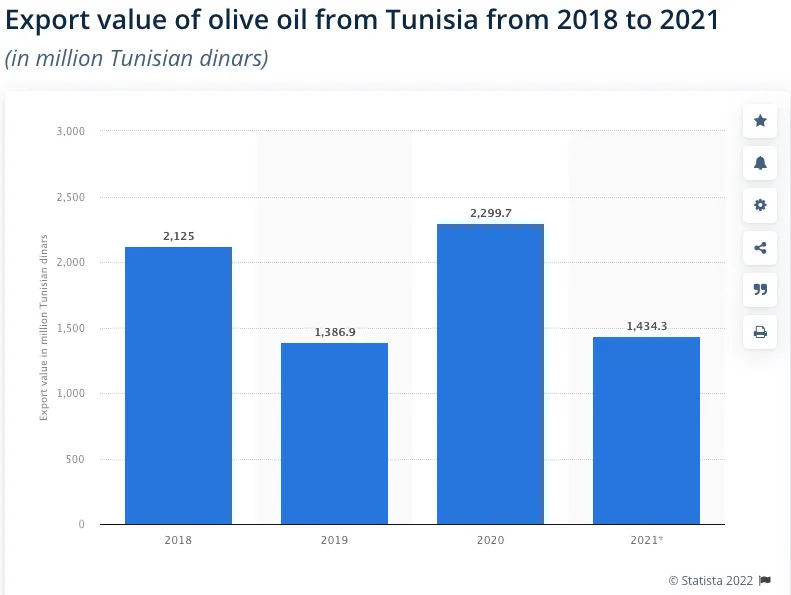November 16, 2025
Tunisian Olive Oil
Tunisian olive oil is often referred to as “liquid gold.” Olive oil producers across the country aspire to make unrivaled oils to compete internationally. More so, olive oil soaks through the cuisine of Tunisia. It is vital to their varied meze, or plates of appetizers, and harissa, a spiced red paste. It cooks fish (a major export), stews and couscous (the country’s national dish), and it is the primary cooking fat in every home.
Tunisia and its Olive Oil
Tunisia lies on the northern coast of Africa, 60 miles from the Sicilian coast. Settled between Algeria and Libya, it is the smallest country in the Maghreb region. Its climate is temperate in the north and semiarid in the south where the land merges with the Sahara desert. The Sahel forms the eastern Mediterranean shore as the country’s major area of olive agronomy.
The Tunisians are welcoming and varied. Nomadic people, or Bedouins, first inhabited the land. Bedouins are still found throughout the country working as shepherds and tending to the groves. Many ride camels throughout the desert, surviving off the barren land.
There is rumor that, thousands of years ago, the Phoenician population was the first to introduce and plant olive trees in Tunisia. Greek, Carthaginian, Roman, Arab and French influences succeeded and cultivated the trees. It is said, too, in the 3rd century B.C., Hannibal sent men to nurture Tunisia’s olive trees. Tunisia’s thriving olive oil production dates back to 8th century B.C.

Types of Olive Oil Growing in Tunisia
Outside the European Union, Tunisia is the largest olive oil producer. It is a leader in the olive oil sector. The country produces 120,000 tons a year, and their resources include over 65 million olive trees.
Since first production, olive oil from Tunisia has been used for many reasons. It is at first fundamental to their cuisine wines and spices. Other uses include:
· To prevent aging in skin,
· To strengthen hair and prevent baldness,
· To massage athletes’ muscles to increase flexibility,
· And as a cosmetic.
There are approximately 500 different olive types that grow in Tunisia to make delectable and diverse olive oils. Olives are found across all regions of Tunisia and over 30% of its cultivated land is dedicated to growing olives. They are grown with other crops ––namely citrus and cereals. The most common olives grown include cultivars Chemlali, Chetoui and Weslati. In the olive grove, there are also variants named Chemléli Jerba, Tounsi, Jerboui, Fakhari, Toffehi, Oueslati, Zalmati, Zarrazi, Chemchali, Chemchéli Zarzis, Marsaline, Sayali and Jemri.
Much of the country’s olive oil is blended, bottled and shipped to other countries in tanker loads. With tender love and care, many homebound quality producers are building their businesses and trying to expand the presence of Tunisian olive oil in kitchens around the globe.
Tunisian Olive Oil Production and Exports
Olive oil production is a source of employment for 269,000 farmers representing over half of the country’s farmers. It accounts for 45% of the country’s agricultural exports with 70% distributed annually. The harvest supplies income to an estimated one million Tunisians as well.
When categorized by age bracket, olive orchards in Tunisia average
· Young: 17%
· Bearing: 58%
· Old: 25%
The total value of the agricultural production in Tunisia accounts for nearly 15% of the country’s economy. Farmers who are paid by the basket commonly handpick the olives, an established tradition of Tunisian culture.

After the olives are picked, the olive oil processors create the (extra)virgin olive oil by slowly cold-pressing the olives. After, the processors ladle the oil by hand. Following separation, the oil rises to the top of the barrel. Depending on the Tunisian olive oil mill, the oil and water are separated by either gravity or a heated centrifuge.
Tunisian Olive Oil Processing Sector
The processing sector of Tunisia is transitioning from traditional methods to the modernized olive oil mills. Currently there are over 1,500 olive oil mills working in the small country. Since 1986, the production rates have soared greatly with these advancements. Yet, traditional mills still outnumber the processing facilities that dot the land. Despite modernization, 52% of olive oil processors practice traditional methods.
The Quality of Tunisian Olive Oil
Tunisian olive oil quality is distinct ––subtle yet bold. Color and maturity at the time of its harvest influence its taste.
Olives that are picked early generate dark and greener oils. Ripe olives produce a lighter and more yellow color oil.
Experienced olive oil processors suggest tasting Tunisian olive oil by dipping bread or drawing a teaspoonful of olive oil into your mouth quickly between tastes of a crisp apple, unflavored sparkling water or freshly sliced fennel.
Tunisian olive oil quality runs across the many olive oils processed.
- extra virgin olive oil
- Virgin olive oil,
- Refined olive oil,
- Olive oil,
- And olive-pomace oil.
Our Tunisian Olive Oil Picks
There are many good olive oil brands on the market. Depending on intensity, you may enjoy Cartago or Safaraya ––both winners of the Best Olive Oils Silver Award. Cartago is produced by Cartago, Inc. and offers a medium intensity. Safaraya is a more delicate blend and is produced by Henchir Karim.
Store-bought Tunisian olive oil may not replace a preferred trip to the Mediterranean Tunisia, but it’s a delicious start to a healthier diet and happier palate at least.
